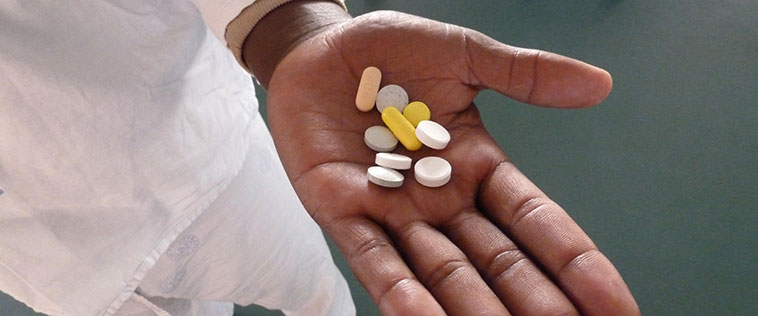- What We Do
- Agriculture and Food Security
- Democracy, Human Rights and Governance
- Economic Growth and Trade
- Education
- Ending Extreme Poverty
- Environment and Global Climate Change
- Gender Equality and Women's Empowerment
- Global Health
- Water and Sanitation
- Working in Crises and Conflict
- U.S. Global Development Lab
- Antimcrobial Resistance
- Bedaquiline Donation Program
- Tuberculosis in India

Antimicrobial Resistance and the Threat of Multidrug-Resistant TB
What Is Antimicrobial Resistance?
Fast Facts on Antimicrobial Resistance
- Antimicrobial resistance can make treating infections a costly, lengthy and difficult process.
- Prominent forms of antimicrobial-resistant infections include multidrug-resistant tuberculosis (TB) and extensively drug-resistant TB.
- Inadequate diagnosis and inappropriate use of drugs can result in the development of antimicrobial resistance.
- Antimicrobial drugs must be used exactly as prescribed, or else they can contribute toward antimicrobial resistance.
- In May 2015, the World Health Assembly endorsed a global action plan to tackle antimicrobial resistance – including antibiotic resistance, the most urgent drug resistance trend.
Antimicrobial resistance (AMR) is recognized as a growing global threat. AMR develops when micro-organisms – bacteria, parasites or viruses – no longer respond to the drug or drugs designed to treat them. AMR is a way for any bacteria that has been exposed to an antibiotic to develop resistance or modify its genetic footprint in order to survive. Antimicrobial resistance occurs everywhere in the world today, compromising our ability to combat infectious diseases, as well as undermining many other advances in health and medicine. AMR also increases the costs of health care. When infections become resistant to first-line drugs, more expensive therapies must be used to treat them. Lengthier treatment, often in hospitals, substantially increases health care costs as well as the economic burden on families and societies.
Antimicrobial Resistance in Tuberculosis
Multidrug-resistant tuberculosis (MDR-TB) is one example of AMR. It is an emerging threat in the era of antimicrobial warfare because the TB bacterium's unique characteristics give it enormous potential for developing resistance to even the strongest antibiotics. Inadequate TB treatment, lack of adherence linked to a failure to complete TB treatment, and the use of poor quality TB drugs can result in the development of MDR-TB, a form of TB that is resistant to two of the most important first-line drugs, and extensively drug-resistant TB (XDR-TB), which is also resistant to some second-line drugs. On average, 3.5 percent of all new TB cases have MDR-TB. XDR-TB, which is the most severe and deadliest form of drug-resistant TB, requires additional drugs for treatment and the cost of medications can be as high as $10,000 per patient.
With approximately 9 million new cases of TB, and about 480,000 cases of MDR-TB emerging in the world in 2013, the global TB burden is still very high. In 2013 alone, MDR-TB claimed the lives of an estimated 210,000 people. When patients with MDR-TB are left untreated, or fail to complete their treatment properly, they transmit resistant forms of TB back into the community and can infect others. This in turn threatens the effective prevention and treatment of TB, making the disease more difficult and potentially impossible to treat.
Without action to check antimicrobial resistance, MDR-TB could cost the global economy a cumulative $16.7 trillion by 2050 and claim the lives of up to 75 million people. Currently, treatment of MDR-TB is a lengthy and painful process that requires up to 24 months of treatment, involving injections and a cocktail of expensive drugs that can have severe side effects, including hearing loss. Treatment of patients with XDR-TB is even more expensive and grueling. In order to stop the epidemic of TB, including resistant forms of it, new medicines, shorter and less arduous treatment courses, and better programmatic approaches are urgently needed.
USAID Leadership in Addressing Antimicrobial Resistance in TB:
In 2014, the White House announced the National Strategy for Combating Antibiotic-Resistant Bacteria (CARB), underscoring the need to address antimicrobial resistance. The Presidential Executive Order “Combating Antibiotic-Resistant Bacteria” directs the U.S. Government to “work domestically and internationally to reduce the emergence and spread of antibiotic-resistant bacteria.”
The U.S. Agency for International Development (USAID) is committed to supporting the implementation of the presidential executive order to combat antibiotic resistance. USAID is supporting the expansion of high quality MDR-TB programs in 23 priority countries and many others through regional platforms and global partnerships, to ensure that patients with drug-resistant TB are rapidly diagnosed and given access to quality treatment through different models of care. In many countries, where the private sector is involved in TB case management, USAID helps develop linkages with the public sector, so TB care can be delivered to all patients in the country, including children and vulnerable groups.
USAID’s innovative partnership with Janssen Therapeutics, one of the Janssen Pharmaceutical Companies of Johnson & Johnson, aims to further step up the global fight against the health threat of antibiotic-resistant bacteria. As part of the collaboration, Janssen will contribute an estimated $30 million worth of TB antibiotics, totaling 30,000 courses of the anti-TB drug SIRTURO® (bedaquiline) to countries around the world with a high-burden of MDR-TB.
Bedaquiline, the first new class of antibiotics approved by the U.S. Food and Drug Administration (FDA) in nearly 50 years, is a powerful new drug to fight drug-resistant TB and has been licensed for use in combination with other drugs when existing treatment regimens to treat MDR-TB are not effective. Access to bedaquiline, however, is challenging in many countries due to the high cost of the treatment regimen, limited medical information about its safe use, and lack of suitable in-country systems to ensure appropriate use and monitoring. USAID will leverage its in-country presence and technical assistance expertise to ensure the quality delivery of bedaquiline in many high-burden countries and support country-based MDR-TB treatment programs. The donation will facilitate access to the life-saving drug and treatment for nearly 100 low- and middle-income eligible countries.







Comment
Make a general inquiry or suggest an improvement.